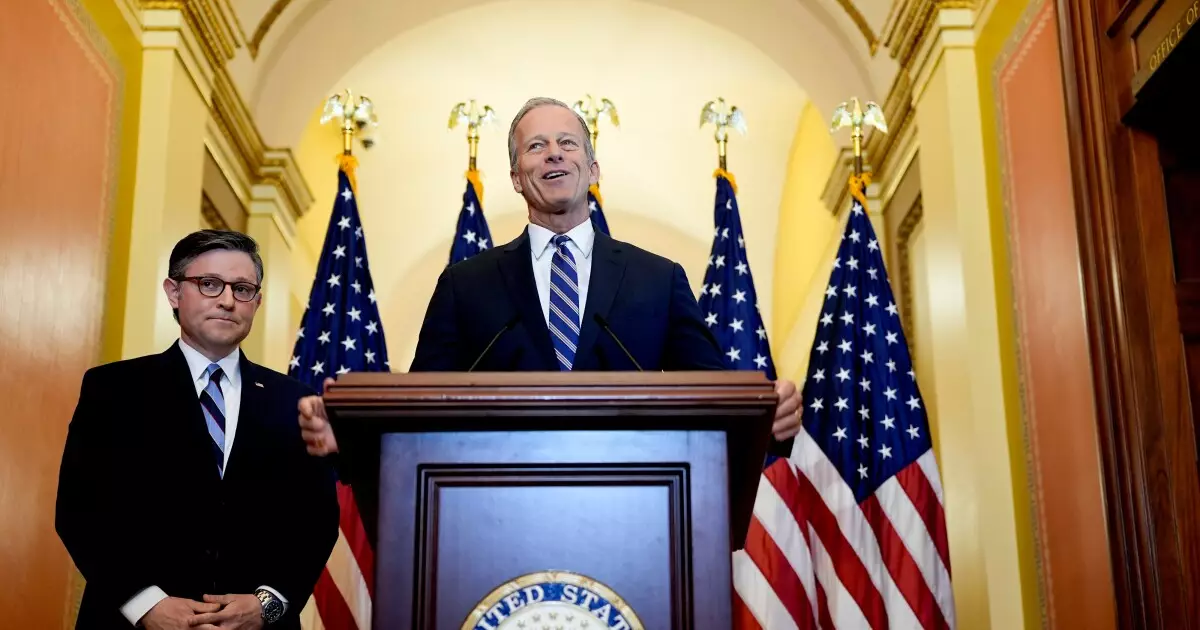5 Reasons Why Trump’s “Big Beautiful Bill” is a Dangerous Gamble

In a narrow vote that showcased the stark divisions within the Republican Party, President Donald Trump’s so-called “big beautiful bill” passed the House of Representatives with a slim 216-214 majority. While the legislation promises substantial tax cuts, many lawmakers who initially hesitated expressed concerns about the bill’s lack of meaningful spending reductions. The crux of the issue lies in the disparity between promises made to voters and the precarious financial reality that this legislation presents. One must question whether pushing through a bill laden with a $5 trillion price tag, accompanied by merely $1.5 trillion in cuts, is a genuinely responsible fiscal strategy.
Instead of confronting the pressing need for more profound budgetary reforms, the leadership has opted to placate dissenters with vague assurances about deeper cuts to come during reconciliation debates. This perfunctory approach to fiscal responsibility reeks of political expediency. By opting for superficial reductions, the Republican leadership risks engendering public disillusionment when the reality of increased deficits becomes evident. Such a strategy significantly undermines the GOP’s credibility as the party advocating for limited government and fiscal conservatism.
The Risk to Municipal Bonds
Perhaps one of the most consequential elements floating beneath the surface of this legislative charade is the looming threat to municipal bonds. Municipal market participants are becoming increasingly concerned that aggressive cuts will drive lawmakers to target the municipal bond tax exemption, presenting a new revenue source for funding deficits. This raises a critical question: at what point does the pursuit of tax cuts lead to real harm for the very constituents they are designed to benefit?
If lawmakers disregard the implications of their financial maneuvers, communities across the country could be left grappling with major funding shortfalls for essential services. Municipal bonds play a crucial role in financing everything from public schools to infrastructure. Sacrificing these exemptions to scratch a political itch could significantly hinder local governments’ ability to operate effectively, leading to higher taxes in other areas.
False Promises of Efficiency
House Speaker Mike Johnson insists his allies aim to make government “more efficient, effective, and leaner” for the American public. Yet this lofty rhetoric veils another layer of political maneuvering. Simply articulated, the idea of making government smaller through cuts without a coherent strategy for what those cuts entail is disingenuous. Efficiency isn’t achieved through arbitrary numbers; it demands comprehensive analysis, strategic planning, and a willingness to make hard choices—none of which appear to be present in this bill.
While the leadership assures us that the Senate will also be significant players in creating deeper cuts, why should we hold our breath for an outcome that reflects genuine fiscal responsibility? Given their recent legislative trend, the focus seems to divert from addressing structural inefficiencies in government spending to merely papering over shortcomings with short-term austerity measures that fail to tackle the underlying issues head-on.
The Dangerous Game of Deceptive Accounting
The accounting methods being employed create a dangerous precedent. Some legislators, like Rep. Victoria Spartz, have rightly warned that these new rules risk “opening up a Pandora’s box.” The manipulation of accounting practices to conceal deficits risks leading us into a fiscal landscape devoid of transparency, laden with hidden liabilities that will ultimately burden future taxpayers.
If we are going to entertain large-scale tax cuts and extensive spending, it is essential that lawmakers articulate a blueprint grounded in reality rather than rely on ambitious shortcuts. Proposals that lack a clear financial framework not only endanger the economic health of our nation but also erode trust in the institutions designed to govern us responsibly.
The Fault Lines in the Republican Coalition
The narrow vote underscored the growing rift within the GOP. Representatives like Thomas Massie and Victoria Spartz resonate with a core group of conservatives who prioritize fiscal responsibility over party allegiance. Their dissent serves as a wake-up call for the party to recalibrate its platform away from superficial populism. The road ahead might be complex and fraught with internal conflict, yet it is critical for the GOP to return to its roots of fiscal accountability.
As this legislative season unfolds, the Republicans must grapple with what it truly means to be a party of limited government. As constituents watch the political theater play out, they are likely to scrutinize whether their leaders are delivering the sound fiscal stewardship they were promised or merely playing a game of smoke and mirrors.





